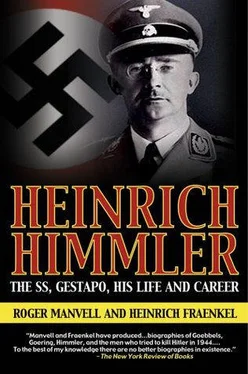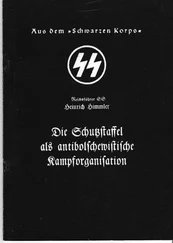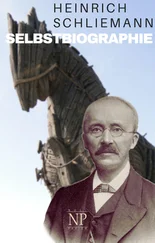‘Dance. Was rather nice. My dancing partner was a Frau [lein] von Buck, a nice girl with very sensible opinions, very patriotic, no bluestocking and apparently quite profound… The girls were on average rather pretty, some close to beautiful… Mariele R. and I talked together for some time… Accompanied Fraulein von Buck home. She did not take my arm which, in a way, I appreciated… A few exercises, to bed.’
Himmler used his diary to castigate himself at those times when he seemed to fall short of his own very modest ideal. He complains that he talks too much, that he is too warm-hearted, and that he lacks self-control and a ‘gentlemanly assurance of manner’. He enjoys helping people, visiting the sick and, occasionally, assisting and comforting old people, going home to visit the family: ‘they think I’m a gay, amusing chap who takes care of things — Heini will see to it’, he writes in January 1922. It is plain that, like many people, he sought recognition and a place in his social and family circle by involving himself as much as he could in other people’s affairs. At the same time, a certain genuine kindness of heart has to be allowed him. But always he sought for popularity and for acceptance in student circles, though his primness of manner and his weak constitution, which prevented him from drinking beer without upsetting his stomach, led his fellow-students to look down on him and to make fun of his excessive diligence.
As a church-goer he remained regular in his habits at least until 1924, though the signs of religious doubt begin to appear much earlier in his diaries. ‘I believe I have come into conflict with my religion’, he writes in December 1919, ‘but whatever happens I shall always love God and pray to Him, and remain faithful to the Catholic Church and defend it even if I should be expelled from it.’ In February 1924 he is still attending church, but refers to his discussions of ‘faith in God, religion, doubts (immaculate conception, etc.), confession, views on duelling, blood, sexual intercourse, man and woman’. The subject of sex exceeds even religion in its attraction, no doubt because of his conviction that abstinence from intercourse was morally binding before marriage. He seems to have remained virgin until the age of at least twenty-six, and he evidently experienced the pangs of unsatisfied sexual desire. After one of his frequent discussions of sex with his friend Ludwig, the bank clerk, he wrote in February 1922:
‘We discussed the danger of such things. I have experienced what it is like to lie closely together, by couples, body to body, hot;… one gets all fired up, must summon all one’s reasoning. The girls are then so far gone they no longer know what they are doing. It is the hot, unconscious longing of the whole individual for the satisfaction of a really powerful natural urge. For this reason it is also dangerous for the man, and involves so much responsibility. Deprived as they are of their will-power, one could do anything with these girls, and at the same time one has enough to do to struggle with one’s self.’
Another tribulation was lack of money. He disliked increasingly being dependent on his family for his maintenance, though he learned how to eke out the allowances he received from his father, and measure most carefully his very modest expenditure on clothes and food. His letters to his parents that have been preserved show how he enumerated each small detail of what had to be done in the way of mending and repairs, as well as small needs for additional sums of money. His letters are always respectful, affectionate and formally gushing:
‘your dear birthday letter… the tie should be mended on the left-hand side… unfortunately I must ask you, dear parents, for money; have only twenty-five of the last hundred marks, which included the monthly thirty… white shirts I never put on for work, so my things are really being saved enormously… the polka-dot tie I got for Christmas is torn in several places… heartfelt greetings and kisses.’
The character of the man is in everything he writes, as well as in the fact that these letters, like so much else from the period — receipts, lists, drafts, ticket-stubs, and so on — survived through his care the holocaust of Germany.
Correctness was all. On 5 November 1921 he attends in hired morning dress the funeral of Ludwig II of Bavaria; a few weeks later he calls formally on the royal widow, who was the mother of his godfather; on 18 January 1922 he takes part in a nationalist student ceremony to commemorate the founding of the German Empire. A week later, on 26 January, he attends a rifle-club meeting in Munich with Captain Ernst Roehm, who, he says in his diary, is ‘very friendly’. ‘Roehm pessimistic about Bolshevism’, he adds laconically.
Roehm was still active in the Army. He was thirteen years senior to Himmler and was soon to become the principal influence in bringing him more fully into contact with politics. Along with his elder brother Gebhard, Himmler was to join the local nationalist corps led by Roehm and called the Reichskriegsflagge, the paramilitary contingent which was later, in November 1923, to join forces with Hitler in the Munich putsch.
Meanwhile Himmler had graduated on 5 August 1922. His studies at the Technical College had included chemistry and the science of fertilizers, as well as the generation of new varieties of plants and crops. His immediate need for work was relieved by an appointment as laboratory assistant on the staff of a firm in Schleissheim specializing in the development of fertilizers. Schleissheim is barely fifteen miles north of Munich; this meant that Himmler did not lose touch with the centre where Hitler was breeding his own particular form of nationalism which had already led to the formation of the National Socialist Party. Although Himmler could not have escaped knowing something of Hitler and his political activities in Munich, the first mention of him in what survives of the diaries does not occur until February 1924, five months after the putsch . Among the many rival or parallel nationalist groups of the period, Himmler, like Goebbels, was initially affiliated to a group that did not come immediately under Hitler’s growing influence.
He was, however, already developing his anti-Semitism, a feeling common enough among the right-wing Catholic nationalists in the south. From 1922 anti-Jewish sentiment grows stronger in Himmler’s diary, although on one occasion he softens a little towards a young Austrian-Jewish dancer he met in a night-club with a friend called Alphons, who had managed to persuade him to indulge in this most unusual expedition. He noted that she had ‘nothing of the Jew in her manner, at least as far as one can judge. At first I made several remarks about Jews; I absolutely never suspected her to be one.’ He made sentimental excuses to himself on her behalf, no doubt because she was pretty and gave him a pleasant shock by admitting she was no longer ‘innocent’. He is less indulgent to a fellow-student and former fellow-pupil at school, a Jew named Wolfgang Hallgarten 6whom he calls Jew-boy (Judenbub) and a Jewish louse (Judenlauser) because he had become a left-wing pacifist. From now onwards there are occasional references to the ‘Jewish question’ in the diaries.
This was in July 1922, shortly before he left college and began to earn his living. Official records show that he did not formally apply to join the Nazi Party until August 1923, four months before the unsuccessful putsch, in which he was to play a minor part as ensign to Roehm’s contingent, the Reichskriegsflagge. 7Roehm’s men did not take part in the notorious march through the streets of Munich led by Hitler and Ludendorff; he had been made responsible for occupying the War Ministry in the centre of Munich. A photograph of Himmler survives in which he can be seen standing near Roehm holding the traditional Imperial standard and peering open-mouthed over the flimsy barricades of wood and barbed-wire. He had come specially from Schleissheim to take part in this exciting event, and its failure cost him his job though not his liberty.
Читать дальше











